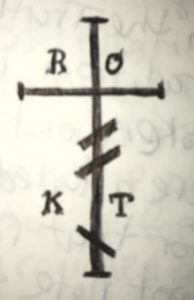Word: “allegory”
allegory (n.)
“figurative treatment of an unmentioned subject under the guise of another similar to it in some way,” late 14c., allegorie, from Old French allegorie(12c.), from Latin allegoria, from Greek allegoria “figurative language, description of one thing under the image of another,” literally “a speaking about something else,” from allos “another, different” (from PIE root *al– (1) “beyond”) + agoreuein “speak openly, speak in the assembly,” from agora”assembly” (see agora). Related: Allegorist.
allegorize (n.)
“turn (something) into allegory, interpret allegorically,” 1570s; see allegory + -ize. Related: Allegorized; allegorizing.
allegorical (adj.)
“consisting of or pertaining to allegory, figurative, describing by resemblance,” 1520s, earlier allegoric (late 14c.); from French allégorique, from Latin allegoricus, from Greek allegorikos, from allegoria “figurative language, description of one thing in terms of another” (see allegory). Related: Allegorically. An allegorical interpretationdraws spiritual or figurative meaning from historical matter.

*ger-
Proto-Indo-European root meaning “to gather.”
It forms all or part of:
aggregate;
aggregation;
agora;
agoraphobia;
allegory;
category;
congregate;
cram;
egregious;
gregarious;
panegyric;
paregoric;
segregate.
It is the hypothetical source of/evidence for its existence is provided by: Sanskrit gramah “heap, troop;” Greek ageirein “to assemble,” agora “assembly;” Latin grex”flock, herd,” gremium “bosom, lap;” Old Church Slavonic grusti “handful,” gramota “heap;” Lithuanian gurgulys”chaos, confusion,” gurguolė “crowd, mass;” Old English crammian “press something into something else.”
Related entries & more
Proto-Indo-European root meaning “beyond.”
*al- (1)
It forms all or part of: adulteration; adultery; alias; alibi; alien; alienate; alienation; allegory; allele; allergy; allo-; allopathy; allotropy; Alsace; alter; altercation; alternate; alternative; altruism; eldritch; else; hidalgo; inter alia; other; outrage; outrageous; outre; parallax; parallel; subaltern; synallagmatic; ulterior; ultimate; ultra-.
It is the hypothetical source of/evidence for its existence is provided by: Sanskrit anya “other, different,” arana- “foreign;” Avestan anya-, Armenian ail “another;” Greek allos “other, different, strange;” Latin alius “another, other, different,” alter “the other (of two),” ultra “beyond, on the other side;” Gothic aljis “other,” Old English elles “otherwise, else,” German ander “other

